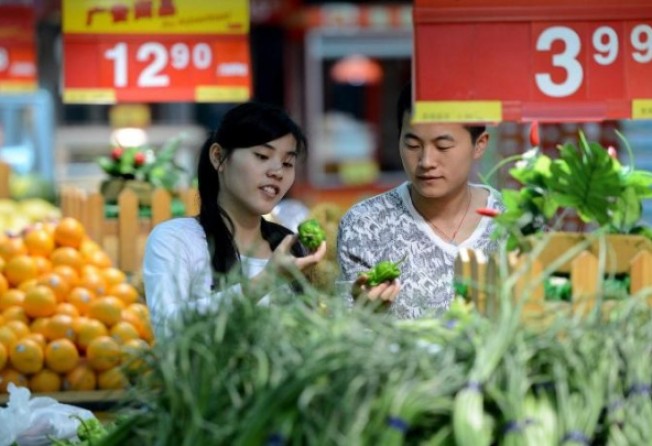China's mild inflation rise leaves door open for rate cut
As consumer price index rises 2.4 per cent in year to April, experts say central bank could ease policy to reduce rate differentials

Chinese inflation rose in April from March but remained relatively low, leaving room for the central bank to cut rates to stem capital inflows and spur domestic demand.
Central banks the world over have been lowering interest rates to spur growth, putting pressure on China to follow suit. But the People's Bank of China should be cautious as inflation may rebound later, some analysts warned.
The consumer price index climbed 2.4 per cent year on year in April, after a 2.1 per cent rise in March, the National Bureau of Statistics said yesterday.
A 5.9 per cent year-on-year rise in vegetable prices owing to cold weather drove the increase. The sharp rise reversed the pattern seen in the decade to 2012, when vegetable prices typically fell in April.
The April inflation figure was tempered by a mild 1.5 per cent rise in meat and egg prices, as the outbreak of bird flu hit consumption.
Meanwhile, in a move that adds to inflationary pressures, the National Development and Reform Commission said yesterday the price of gasoline and diesel would increase by 95 yuan (HK$120) per tonne starting from today.
The producer price index, an advanced indicator of inflation, dropped 2.6 per cent in April from a year earlier.
"We believe that the mild inflation outlook, together with sluggish domestic demand, has set the right conditions for a rate cut," Australia and New Zealand Bank economists said.
ANZ said the central bank could allow banks to raise their deposit rates to up to 1.2 times the benchmark rate, which would "not only push forward interest rate liberalisation but also reduce the possibility of a negative real interest rate".
That view was shared by economists at investment banks, including Societe Generale and Daiwa Capital Markets.
The State Council laid out reform plans in a meeting chaired by Premier Li Keqiang this week. It pledged to further liberalise interest rates.
Central banks in South Korea, Australia, Europe and India have lowered interest rates recently.
Barclays Capital said a cut in interest rates combined with a rise in the deposit-rate ceiling could not be ruled out but that the "base case", of interest rates staying unchanged this year, remained the same.
The bank yesterday cut its full-year consumer inflation forecast for China to 3 per cent.
China's widening interest rate gap with Western nations has added pressure on the yuan to rise, prompting the foreign exchange regulator to tighten rules on banks holding foreign exchange assets.
An unexpected surge in export growth over the past few months has fuelled speculation that many companies may have inflated trade invoices to bring overseas funds into the mainland for arbitrage gains.
Some economists said an interest rate cut was not imminent, as inflation could rebound as early as this month owing to last year's low comparison base.
Nomura International's chief China economist, Zhang Zhiwei, forecast inflation to rise to 2.7 per cent in May and 2.9 per cent in June.